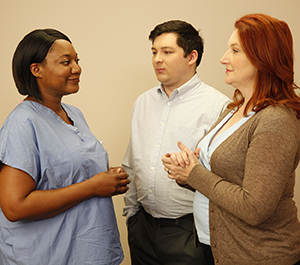A
B
C
D
E
F
G
H
I
J
K
L
M
N
O
P
Q
R
S
T
U
V
W
X
Y
Z
Click a letter to see a list of conditions beginning with that letter.
Click 'Topic Index' to return to the index for the current topic.
Click 'Library Index' to return to the listing of all topics.
Tonsil, Adenoid, and Ear Tube Surgery: Going to Surgery
Your child will be cared for by a surgical team. This team will include a surgeon, one or more nurses, and other healthcare professionals. An anesthesiologist or nurse anesthetist will give your child medicine to make them fall asleep. They may talk with you about your child's health before the surgery.
Going to surgery
What to expect:
-
Before going to surgery, your child may be given a sedative to help them relax.
-
Your child's blood pressure, breathing, oxygen level, and heart rate will be monitored during and after surgery.
-
The surgeon will speak with you when the operation is over. A nurse will let you know when you can see your child a short time after surgery.

Your child will meet caring people in the operating room
There are so many people at the hospital! Your child will see their healthcare providers. Your child will also meet an anesthesiologist who will give medicine to make your child sleep through the procedure. The healthcare providers may look a little silly because they are wearing hats, gloves, and masks. They all want to help your child feel better.
Your child will get on a special bed with wheels. Your child will have stickers on their chest. Your child will also have a soft clip on their finger to tell how much oxygen is in their blood. These things will help the healthcare providers take care of your child.
Online Medical Reviewer:
Ashutosh Kacker MD
Online Medical Reviewer:
Rita Sather RN
Online Medical Reviewer:
Tara Novick BSN MSN
Date Last Reviewed:
3/1/2022
© 2000-2025 The StayWell Company, LLC. All rights reserved. This information is not intended as a substitute for professional medical care. Always follow your healthcare professional's instructions.